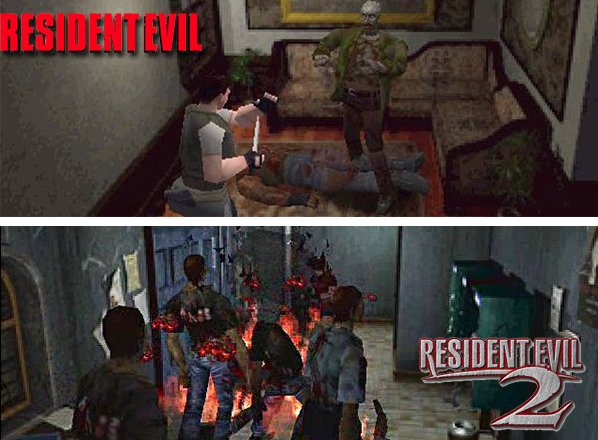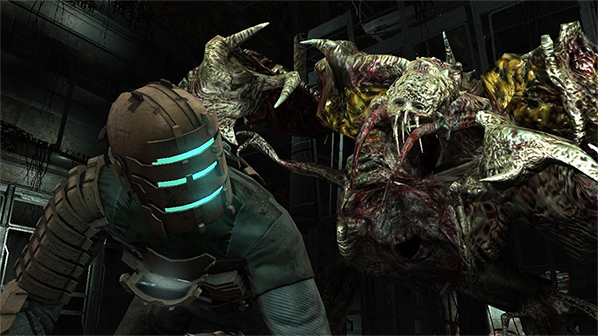This post has not been edited by the GamesBeat staff. Opinions by GamesBeat community writers do not necessarily reflect those of the staff.

Dead Space 3 did exactly what everyone expected it to do.
The series slowly outgrew it roots as developer Visceral Games transplanted it from the land of survival-horror to the more financially fertile soil of the third-person action shooter. Today, the franchise has completely abandoned that which helped it garner its popularity in the first place, only referentially acknowledging these traits in the item-dense lulls between polished action set pieces. Both literally and figuratively, we find ourselves an awfully long way from the Ishimura.
I don’t know that anyone held out hope for another outcome, but they would have faced a mountain of evidence to the contrary if they had. No survival horror franchise since the genre’s inception has been able to hold on to more than “survival” past the initial outing.
The original Dead Space came along at a time when survival-horror had become as lifeless as the creatures that haunted its murky corridors. The genre had long since become a victim of its own success and forced to cater to a bigger audience that required a more “broadly appealing” experience. As with the latest Dead Space, Visceral thickened some aspects of its gameplay, watered down others, and added and removed even more elements; the flavor changed. For the worse? Not necessarily. Different? Certainly.

Above: Extrapolate, and this image not only explains Resident Evil’s progression as a franchise but why Chris started taking ‘roids.
At the outset of creating something “new,” an artist’s financial backers perceive him as a risk. And there will be financial backers. All ambitious creative pursuits require a budget, and the price of that budget is high expectations. Visceral had never truly released a proper “hit” when it began development of Dead Space. The studio was hungry — eager to prove itself. But it was still entering uncharted territory, and Dead Space certainly had some rough edges that, as brilliantly pointed out in the Ars Technica review of Dead Space 3, lent themselves to the game’s atmosphere and much of its appeal as a horror title.
This very appeal gave Dead Space the popularity that ultimately damned its inevitable sequels. It’s a phenomenon seen across the artistic spectrum. Self-titled debut vs. reunion tour. Episode IV vs. Episode I. Fear and Loathing in Las Vegas vs. Hey Rube. Artists and even their concepts are like a tuning fork. When first struck, the tune is loud and steady, then it slowly fades to silence, a tone with all the inescapable allure of the siren’s call.
Falling in love with a new game idea is a dangerous affair. Someone is going to get hurt. Public relations catchphrases like “bigger and better,” “exciting new direction,” and “highly polished,” start to wither the corners of common sense, manifesting with the thinly veiled condescension of “let’s just be friends” from the scowl of a jilted lover. These phrases are ugly when laid bare. They represent the death of that which we fell in love with in the first place — that which established the relationship. This odd paradox is present in nearly all creative pursuits.
That does much to explain the fecund ire presently infecting nearly every game reviewer with a keyboard and a copy of Dead Space 3. While Dead Space 3 hasn’t fallen victim to many ratings below “good,” it doesn’t fare well when compared to its predecessors. The principle complaint is the aforementioned: Dead Space 3 lost touch with its roots. And truly, it is a fundamentally different experience. But when taken moment-to-moment, all the gameplay and environmental elements that fans of the franchise point to as evidence of Dead Spaces’s greatness are present and accounted for in the third one.
About halfway through the game, those elements are left behind for an admittedly less frightening environment, but why should Dead Space 3 endeavor to be Dead Space? Another ship? More narrow black corridors? Another game in which one could get by with nothing more than a plasma cutter? Visceral would be reviled for shoveling out a sequel that didn’t do anything to advance the franchise.
The first time a necromorph burst from a vent in Dead Space and snacked on Isaac’s jugular was unexpected and terrifying. The four thousandth necromorph an hour into Dead Space 4 can’t possibly have the same impact. The first blood covered room filled with supplies no longer needed by its deceased denizens created a palpable sense of dread. That same room four years and two-and-half games later delivers a far more cushioned blow.

Above: In spite of Foreigner’s insistence, it will never “feel like the first time.”
Those moments are gone, and I can no more possess them than a sieve possesses liquid. First viewing, first listen, first kiss, first shot of heroin; the first time is always the best, and we can never get it back. We crave more from our love, demand more, and beg for more like a junkie on a dirty mattress. We want something that can’t be given, and god help the object of our affection should they attempt to deliver.
As a fan of Dead Space, I know that it will never scare me again. I know this, but I still enjoy the game. Perhaps the designers understood this concept, perhaps not. But anything less than a game that was fundamentally not Dead Space stood no chance of delivering the magic of the first.
Those slamming Dead Space 3 for stepping away from what the franchise was should avail themselves of the phrase “familiarity breeds contempt.” They’re mad because it changed, but they’d have been equally mad if it had stayed the same. They aren’t angry at Dead Space 3 or the game industry they claim is stale and devoid of original concepts. They’re mad at time, reality, and the insurmountable peak of their own expectations. They wanted to own that moment from the Dead Space, and god didn’t help the franchise when it attempted to deliver. Dead Space 3 could have done anything, everything, or nothing — it wouldn’t have mattered.
At least this proves that games are art: No object or performance or collection of words is truly a work of art until it triggers an emotion. With their unique means of conveyance (projection of the player on to his avatar), it seems that video games trigger an equally unique and specific emotion: frenzied, possessive, crushing, childish love. True love.
And no one has truly loved anything until they’ve absolutely fucking hated it.
